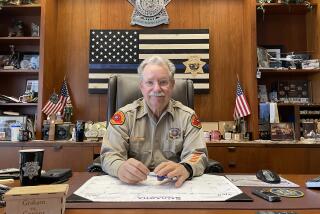Ride-Along Policies Stress Precautions
- Share via
For law enforcement agencies, it’s the ultimate public relations tool: Let the average citizen take a ride in a patrol car, so he or she can see firsthand what the job is like.
Across Ventura County, agencies from the Sheriff’s Department to the U.S. Coast Guard take residents on ride-alongs, hoping to build trust and goodwill.
On Monday, officers agreed that a civilian getting hurt is about the worst thing that can happen during one of these goodwill rides.
That’s what happened Sunday night, when Thomas Gregory Frost of Somis was apparently mistaken for a coyote and shot in the chest by a teenager during a ride through Camarillo with a state Department of Fish and Game warden.
Frost, 21, had gotten out of the patrol car to help Matthew Galli, the warden, investigate gunfire in the area, according to sheriff’s officials.
Although state officials would not say whether Galli told Frost to stay put, local police officers said strict department policies bar them from letting civilians get involved at crime scenes.
“The officer of the car is in charge of making sure the ride-along is not placed in an inherently dangerous situation,” said Capt. Keith Parks of the Sheriff’s Department, which gives about 2,000 such rides a year. “There’s no way we’re taking a ride-along into a serious situation.”
The Sheriff’s Department and other local agencies take similar precautions.
For instance, they warn passengers to remain in the car at all times, telling them they can only get out if the officer says so.
If a radio call sounds particularly dangerous, officers can cut the ride-along short and drop the passenger off at the station before heading to the scene.
And to prevent lawsuits, police agencies require passengers to sign waivers stating they will not sue if they get hurt during the ride.
The precautions appear to work: Officials at the Sheriff’s Department, county Fire Department, Simi Valley Police Department and U.S. Coast Guard said they could not recall an instance in which a civilian passenger was hurt during a ride-along.
Fish and Game officials also said they could not recall such an incident. A department spokesman said the calls game wardens investigate consist largely of incidents such as oil spills, fishing violations and other situations that are not life-threatening.
If a civilian passenger does encounter danger, officers are trained to get the person out of harm’s way as quickly as possible.
“If something goes down, we tell you where to go, like inside cabins,” said Petty Officer Marc Fischer of the U.S. Coast Guard’s Channel Islands station, which provides ride-alongs to the press but not to the general public.
“If somebody whips out a gun or gets hostile, we need you to get out of the way,” he said.
Added county Fire Department spokeswoman Sandi Wells: “It’s the worst possible scenario--for someone riding with us to be injured. We give them a lot of information before the ride-along, so they’re aware of the situations they could encounter.”
More to Read
Sign up for Essential California
The most important California stories and recommendations in your inbox every morning.
You may occasionally receive promotional content from the Los Angeles Times.













